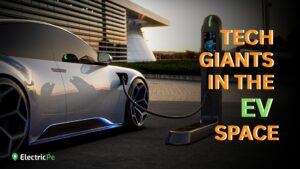As the electric vehicle (EV) landscape in India continues to evolve, 2024 promises an exciting lineup of models that blend performance, range, and affordability. This article provides an overview of the top electric cars launched in India in 2024, focusing on their mileage, pricing, and distinctive features.
Best Electric Cars in India 2024
The Indian automotive landscape is rapidly transforming with an increasing focus on EVs, given their environmental benefits and the evolving regulatory framework promoting cleaner mobility. As of 2024, there are several popular electric cars in India, reflecting a broader shift towards sustainable transportation solutions. These are just the starting prices of these vehicles and on-road prices will depend on the region you are in.
Tata Nexon EV
The Tata Nexon EV continues to lead the market with its robust design and reliable performance. It features an extended range of up to 465 km on a single charge, with prices starting at Rs. 14.74 lakh. The vehicle offers a blend of safety, style, and advanced technology, making it one of the best electric cars available
Hyundai Kona Electric
Known for its impressive range of approximately 452 km, the Hyundai Kona Electric combines performance with style. The Kona is priced at Rs. 23.84 lakh and stands out with its high-efficiency battery pack and low running costs, appealing to those who seek a premium electric driving experience.
MG ZS EV
The MG ZS EV offers an impressive range of up to 461 km. With its stylish design and suite of safety features, the MG ZS EV is priced from Rs. 23.38 lakh, making it a competitive option in the electric SUV segment.
Tata Tigor EV
For those looking for a more affordable option, the Tata Tigor EV provides a reliable range of up to 306 km, with prices ranging between Rs. 12.49 lakh and Rs. 13.75 lakh. It’s an efficient choice among popular electric cars.
Citroen eC3
This compact electric car offers up to 320 km on a single charge and starts at Rs. 12.69 lakh. It combines efficiency with a stylish design, suitable for city driving.
Tata Punch EV
The Tata Punch EV is positioned as an affordable electric compact SUV, with its price ranging from Rs. 10.99 lakh to Rs. 15.49 lakh. It offers two battery options—a battery capacity of 25 kWh with a range of 315 km and a larger 35 kWh battery providing a range of 421 km. The Punch EV features advanced connectivity and safety options, including a 10.25-inch touchscreen infotainment system, ventilated seats, and a comprehensive safety package. It’s available in various trims, each adding more features, culminating in the top-spec variant which includes amenities like a sunroof and a 7.2kW AC fast charger
Tata Tiago EV
The Tata Tiago EV, another significant entry by Tata into the electric vehicle market, offers practicality and affordability in a compact form. While specific updates and price details for 2024 were not immediately available, it’s aimed at being an accessible EV option with features and pricing adjusted to attract entry-level buyers and those transitioning from gasoline vehicles
MG Comet EV
The upcoming MG Comet EV is set to enter the market as a compact and stylish electric vehicle, with prices expected to start from Rs. 6.99 lakh and go up to Rs. 9.24 lakh. This makes it an enticing option for those looking to purchase their first EV without breaking the bank. The Comet EV will likely come with a range suitable for city driving and daily commutes, equipped with modern tech and safety features to appeal to a tech-savvy audience
Upcoming Electric Cars in India for 2024
The year 2024 is set to witness an exciting lineup of new electric vehicles (EVs) in India, catering to various segments from luxury to more budget-friendly options. Here’s a glimpse of what to expect:
Tata Curvv EV:
Expected price will be between Rs. 14 lakh and Rs. 20 lakh, the Tata Curvv EV introduces a new SUV-coupe style to the market. It promises a range of 400-500km on a single charge with features like a panoramic sunroof and rapid charging capabilities
Maruti Suzuki eVX:
With an estimated price of Rs. 22 lakh, Maruti Suzuki’s first electric vehicle aims for a market-leading range of 550km powered by a 60kWh battery. This model targets accessibility without compromising on performance or safety
Hyundai Creta EV:
Priced around Rs. 23-25 lakh, the Hyundai Creta EV will transform the popular Creta model into an electric variant, blending familiar design with electric powertrain technology and expected features like rapid charging and a range exceeding 400km
Skoda Enyaq iV:
This vehicle will come as a full import and is expected to cost around Rs. 65 lakh. It will feature a 77kWh battery, offering an impressive range of over 500km and advanced all-wheel drive capabilities
Volkswagen ID.4:
Expected to be priced at Rs. 65 lakh, the Volkswagen ID.4 will offer a 77kWh battery with a range of about 400km. It’s part of VW’s ambitious electric vehicle lineup for India
Mercedes-Benz EQS SUV:
Slated for a release with a starting price around Rs. 2 crore, this luxury electric SUV will offer advanced features typical of the Mercedes-Benz brand, including a high-range battery option
Future of Electric Cars in India
The future of electric cars in India looks promising with several upcoming electric cars slated for launch. Manufacturers are focusing on extending the range, reducing charging times, and making EVs more accessible. The introduction of models like the MG Comet EV and expansions in the Tata EV lineup underscore the growing commitment to electrification.
Electric car prices have started to become more economical and have come down significantly in the recent years. As the electric vehicle (EV) market evolves, affordable electric vehicles are becoming increasingly accessible, making the shift to electric more viable for a broader audience. Enhanced charging infrastructure is pivotal in this transformation, reducing range anxiety and making the day-to-day running of an electric car more practical. Since the inception of electric vehicles, advancements in technology have continually improved their efficiency and reduced operational costs.
Today, running an electric vehicle is more cost-effective due to lower maintenance requirements and the increasing availability of charging options. This development not only supports environmental initiatives but also offers a sustainable alternative to traditional combustion engine vehicles.
Cost and Infrastructure
The ex-showroom price of electric cars varies, reflecting the diversity in offerings from luxury to more economical models. The running costs of EVs are generally lower compared to traditional internal combustion engine vehicles, due to fewer moving parts and lower fuel costs. However, the availability of charging infrastructure continues to be a critical factor in the adoption of EVs in India.
As the market evolves, the focus on hybrid cars also continues, providing consumers with a bridge technology that combines internal combustion engines with electric powertrains, offering another pathway towards full electrification.In summary, as more consumers in India embrace electric vehicles, the shift is supported by advancements in battery technology, government incentives, and a growing awareness of environmental issues. This shift to electric vehicles is not only reshaping the auto industry but also contributing to the global efforts in reducing carbon emissions.
EV Charging Infrastructure in India
With the increase in EV adoption, India is rapidly expanding its network of charging stations, enhancing the viability of electric cars across longer distances and encouraging more consumers to transition to electric mobility.
Conclusion
The electric vehicle market in India in 2024 offers a diverse range of options, from economical models ideal for daily commuting to luxurious vehicles loaded with advanced features. Supported by growing infrastructure and government initiatives, the EV market in India is poised for significant expansion, offering promising prospects for both new and existing consumers.





